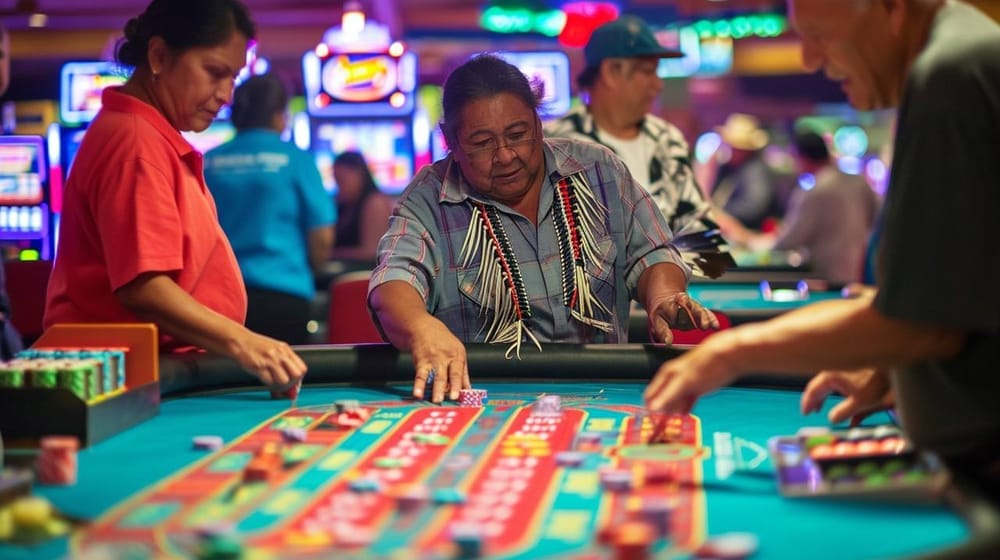The enclave of North American Indians stands as a fascinating phenomenon within the modern gambling industry. Through local self-government in their territories, tribes have secured a strong position in business, operating under laws distinct from those in US states and Canadian provinces. In a remarkable turn of events, the economic survival of once-poor tribes today is predominantly linked to gambling, enabling them to preserve their cultural identity and maintain a respectable standard of living on reservations.
Origins of Indian Gambling
The gambling inclination among Indians has deep cultural roots, with board games, including those involving money and valuables, representing a significant aspect of indigenous peoples' traditions. The foray into money-making gambling ventures began in the 1970s when a tribal leader in New York State initiated special clubs on the reservation, offering bingo games with cash prizes surpassing state allowances. Despite attempts by the New York prosecutor to shut down the establishment, the Indians, guided by their own laws established by tribal leaders, contested the legitimacy of external demands. Reservations, governed by chiefs or councils of chiefs, had their own rules allowing gambling and large bets. Subsequently, after the success of the initial bingo club, straightforward gambling establishments with high stakes emerged in other states.
The Legal Battle and Evolution
The 1970s witnessed a legal conflict between state district attorneys and Indian leaders, with prosecutors seeking to ban gambling on reservations. Indians responded by filing lawsuits against government officials, asserting the autonomy granted to reservations by the country's constitution. In a landmark decision in 1987, the US Supreme Court ruled that state governments lacked the authority to prohibit gambling on Native American territories. This paved the way for President Ronald Reagan to sign a decree in 1988 regulating the operations of tribal casinos.
Over the following decade, what began as small bingo clubs underwent a transformative journey into expansive casinos. These establishments not only provided economic sustenance for Native American communities but also became crucial in preserving their cultural heritage. Traditional forms of gambling, such as poker, blackjack, roulette, and indigenous games, found a place in these evolving tribal casinos.

Regulation of Tribal Casinos: Balancing Autonomy and Formal Oversight
In the intricate landscape of US law, federally recognized tribes possess the right to establish gambling enterprises, contingent upon the permissibility of gambling within the respective state. The ambit of wagers is delineated by local tribal laws. A specific US law delineates three sanctioned forms of gambling activities on reservations:
Social and Traditional National Games: These games, deeply rooted in national culture and imbued with symbolic prizes, are often linked to rituals and traditional practices. The allure lies in their cultural richness, drawing enthusiasts seeking a unique and authentic gaming experience not found in conventional casinos.
Board Games: Embracing traditional offerings like lotto, bingo, lottery, and non-bank card games, this category reflects a broader spectrum of gaming experiences prevalent in various countries.
Casino-Style Games: Encompassing slot machines, roulette, poker, blackjack, and various betting options such as greyhound and horse racing, this category represents a comprehensive array of gaming choices within tribal casinos.
With time, the emergence of the National Indian Gaming Association (NIGA) has played a pivotal role in addressing internal matters concerning tribal casino operations while safeguarding the rights of Indian gambling business proprietors.
At the federal echelon, Indian tribal casinos gained formal recognition in 2007. Originally, 225 tribes operated 423 casinos, a number that has since burgeoned to over 500 establishments across the United States, with a notable expansion into Canada. These casinos contribute significantly to an annual income surpassing $40 million, contributing to reservation development and sustaining a commendable standard of living for the indigenous population.
Formally, tribal casinos adhere to a three-tier regulatory model: national, federal, and tribal. NIGA assumes oversight of casino activities and the licensing process, backed by law enforcement agencies empowered to impose sanctions against violators of domestic or federal laws. Many establishments face sanctions due to delayed submission of operational audit reports.
Federal intervention becomes imperative in instances of fraudulent schemes or criminal offenses within tribal casinos. Meanwhile, state-level regulations involve legal agreements between tribes and government officials, encompassing player age restrictions, responsible gambling principles, and stipulated contributions to the state budget.

Legislation for Tribal Casinos: Navigating Formality with Autonomy
Despite the formal three-tier regulatory structure, tribal casinos navigate through their own set of laws. An illustrative instance is their continued operation during the COVID-19 pandemic, notably in Florida and California, where tribal leaders' decisions superseded federal regulations. The unique business conditions prevailing in tribal casinos contribute to their exceptional profitability, solidifying their status as among the most lucrative entities in the US and Canadian gambling industry.









